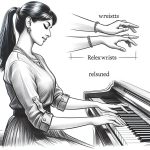If you're like me, you've probably asked yourself, "Should I learn sheet music before diving into piano?" It's a common question that stirs up quite a debate among musicians.
In this article, I'll explore the pros and cons of learning sheet music before hitting those piano keys. We'll delve into how understanding sheet music can enhance your piano playing skills, and why some might argue it's not a necessary first step.
Understanding Sheet Music
Stepping into the world of music, I found sheet music to be an invaluable tool. It's a universal language that transcends borders, connecting musicians around the globe. Let's delve into the basics of what drawing these lines and dots on paper means.
Sheet music, for those unfamiliar with it, is a musical map. Imagine being lost in a city with no guide to help you. That's what it's like playing an instrument without music written down. This "map" embodies both rhythm and pitch - the heartbeat and voice of a song. As you read the lines, you're essentially deciphering a rhythmic code.
Engaging with sheet music facilitates quick learning. It's not just about playing back pieces composed by others. It empowers you to compose and share your music too.
I recall when I first sat down with a composition in front of me. The intimidating clusters of notes gradually became sequences of rhythm and melody under my fingertips. Suddenly, I was connected to a network of artists who had sat at their pianos, scribbling down their thoughts in the same language countless years before.
It's essential to note that mastering sheet music doesn't occur overnight. It requires consistent practice. My daily sessions engraining notation into my fingers and ears eased the journey, making complex compositions accessible and enjoyable.
Sure, there are successful musicians who've never used sheet music. However, knowing how to read and write these musical codes unlocks a world of possibilities.
Key facts:
- Sheet music is a universal language in the music world.
- Sheet music is not just for playback but also facilitates composing and sharing music.
- Mastering sheet music requires consistent practice.
The transition into the world of sheet music may seem challenging at first. Yet, with practice and determination, it becomes less of a puzzle and more of a compass guiding your musical exploration.
Pros of Learning Sheet Music First
As we navigate this musical voyage, it's important to acknowledge the benefits of mastering sheet music before jumping directly into piano playing. With sheet music, we lay a robust foundation that aids our musical journey, regardless of the instrument we choose.
For starters, sheet music is akin to the universal language of musicians. Understanding this language means being able to communicate with musicians from all corners of the globe. It’s far more than a mere collection of notes - it’s a structured language that signifies rhythm, tempo, and dynamics. Once you've grasped the basics of reading sheet music, playing any musical piece, foreign or familiar, won't be as daunting.
Moving on, sheet music acts as a roadmap, guiding us along the various nuances of a musical piece. It gives us insights into the composer's mindset, revealing every intentional crescendo and planned pause. This roadmap not only informs us where to go but why we should take specific paths. Its markings provide vital information about the mood, dynamics, and level of intensity each note or series of notes should carry.
We can't ignore that learning sheet music first allows us to unlock our creativity. It’s a tool, which once we've learnt to use, unleashes our potential to create music. By understanding sheet music, we acquire the ability not just to play, but to compose. This is a powerful step towards sharing our own musical narratives.
Lastly, infusing independence into our practice is a profound advantage. With the skill to read sheet music, we become self-reliant learners. We can pick up any piece of music and begin decoding it on our own. By tackling pieces independently, we develop a deepened sense for detail and interpretation, making the music we play uniquely ours.
From enhancing communication with musicians globally, acting as a roadmap to a composer's intentions, fostering creativity, and inculcating self-reliance, the benefits of learning sheet music as a precursor to piano playing are undeniable. As rigorous as the learning process may seem, the wealth of opportunities it opens up is well worth the commitment.
Cons of Learning Sheet Music First
Before tackling the piano, some folks raise an eyebrow at the idea of first learning sheet music. Indeed, while mastering the universal language of musicians has ample benefits, there are cons too. So, let's delve into the potential drawbacks of this approach.
A significant downside is that learning sheet music can be time-consuming. Music theory is an extra field of study you'll need to venture into before actually hitting the piano keys. It's complex, and can be overwhelming for beginners. This extra learning curve could push beginners into frustration and potentially deter them from continuing piano lessons.
Moreover, developing the bot-like precision to read musical notation may deter some creativity. Following sheet music strictly can sometimes curtail the freedom to improvise or to put one's unique spin on a piece. Yes, sheet music is an excellent roadmap, but being overly reliant on it may limit your ability to discover your own musical path.
Finally, this preference for theory-before-practice may give rise to the risk of over-reliance. For those who master sheet music first, the chances are good that they'll cling onto it for every piece they play. This may restrict the progress of playing by ear, a skill equally vital to creating and understanding music.
| Drawbacks | Brief Explantion |
|---|---|
| Time-Consuming | Learning sheet music before actually playing can take a significant amount of time. |
| Limits Creativity | Strict adherence to sheet music might hinder improvisation and personal expression in the music. |
| Over-Reliance | Learning sheet music first might lead to an over-reliance, hindering progress in playing by ear. |
Let it be known, however, that these cons do not negate the benefits of learning sheet music. They simply present a more complete picture, showing the hues of grey that exist in the world of music learning. Understanding these cons can better prepare you for the journey and help you to align your learning approach to your personal goals.
Developing Musicality Without Sheet Music
Before delving into this discussion, it's crucial to establish that musicality isn't solely dependent on understanding sheet music. Certainly, this classical approach to music is a vital component of structured learning but it isn't the only path to developing musicality.
Many of the world's most famous musicians, like The Beatles and Elvis Presley, never read sheet music, yet they managed to leave an unforgettable mark on the landscape of music. How did they do it? Well, these legends honed their musicality through a blend of playing by ear, improvising, and experimenting.
When you begin exploring piano without sheet music, you'll quickly discover that you're training your ears to recognize different chords, phrases, and melodies. You'll also start to create your own music, which can be a more direct and satisfying experience than reading from a pre-existing template.
Playing by ear is a valuable skill that can complement your understanding of music theory and enhance your overall musicality. You'll be able to listen to a piece of music and identify specific chords, phrases, and melodies without referring to sheet music. This is not only a fantastic party trick, but it aids in improv jam sessions and gives your musical expression a certain freedom that rigidly sticking to sheet music might not.
Improvisation can be another key to unlocking your musicality. It encourages spontaneous creativity, which can help to develop your individual musical voice. Improvising on the piano can also help you to internalize chord progressions and other musical structures, giving you a more intuitive understanding of how music works.
Finally, experimentation is an essential practice for any nascent musician. By playing with different sounds and styles, you can learn a lot about your own musical preferences and strengths. When you're free to make music that doesn't have to sound any particular way, you can find a greater sense of joy and fulfillment in your piano practice.
In short, while it's clear that sheet music is a useful tool in learning the piano, it's not the be-all and end-all. Nurturing your musicality without constantly referring to sheet music can open a world of possibilities in your journey as a pianist. From playing by ear to improvising and experimenting, these approaches offer unique insights and growth that sheet music might overlook in certain aspects.
Conclusion
So, should you learn sheet music before piano? It's not a necessity. Sure, sheet music is a valuable tool, but it's not the end-all-be-all of piano learning. It's possible to develop a strong musicality without it, as shown by icons like The Beatles and Elvis Presley. It's about finding balance. Learning to play by ear, improvising, and experimenting can unlock a world of creativity and freedom. Don't let the fear of sheet music hold you back. Dive into the piano world, explore, and make your own path. After all, music's about expressing yourself, and there's no one-size-fits-all way to do that.
Harlan Kilstein began playing piano during covid with no piano background at all. He taught himself how to play learning what to do and what not to do.
Today he's an advanced intermediate player and can help you grow in your skills because he learned all this on his own.







